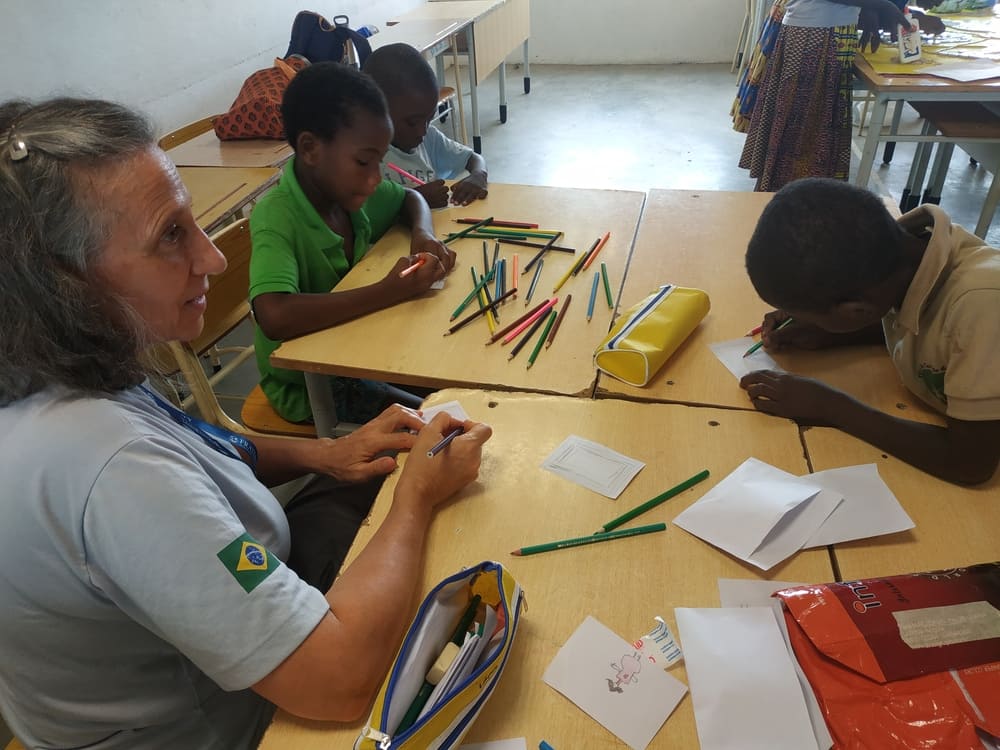Members of the Fraternity – International Humanitarian Missions (FIHM) carried out cognitive, emotional and psychomotor pedagogical activities with 12 children and adolescents with special educational needs at Casa da Criança Santa Isabel (Children’s House of Saint Isabel) in Luanda, Angola.
Specific materials were prepared to provide a more personalized service, which would contribute to the identification of priorities in the teaching/learning of each one of them and thus, stimulate them in what they present as potential.

“We saw that the participation of some teenagers in a more complex group activity, such as the mosaic technique, could promote greater self-confidence. For other boys and girls, playing with letters, forming words, could be a way to continue incorporating the reading tool”, explains Angélica Baglivo.
Activities such as vocal games and massages were also carried out to stimulate the entire phono-articulatory system. These exercises contribute to the correction of muscle patterns, stimulate facial mobility and the acquisition of language and communication.

The activities were developed individually and in groups. In the individual field: didactic games with letters, curved and straight lines, colors and puzzles. In group tasks: music, rhythms, stretching, making notebooks and drawing with the mosaic technique.
“The time we shared was very enriching, it allowed us to bond and build trust”, says Angélica.
The humanitarian worker explains that, through the activities carried out, it was possible to identify challenges and potentialities and, from there, generate proposals so that the initiative can continue and deepen at Casa da Criança Santa Isabel in 2023.

No one less
A look at the reality of people with disabilities in emergency situations, prolonged crises and humanitarian responses
According to the World Report on Disability, more than one billion people around the world live with some form of disability, of which around 200 million experience considerable functional difficulties.
Around the world, people with disabilities have worse health prospects, lower levels of education, lower economic participation and higher poverty rates than people without disabilities. In part, this is due to the fact that people with disabilities face barriers in accessing services such as health, education, employment, transport and information. Such difficulties are exacerbated in the poorest communities.
Situations of armed conflict, socio-environmental catastrophes and prolonged crises tend to affect the most marginalized in particular: girls and young women, low-income families, children and young people living without parents, refugees, people with disabilities and the elderly. To mitigate this situation, humanitarian actors, organizations, UN agencies and governments are carrying out intensive work in finding better management approaches for emergency situations, improving construction design and running training exercises for teams working in humanitarian responses.
The Education in Emergency manager of the Fraternity – Humanitarian Missions (FIHM), Anderson Santiago, recalls that “in emergency situations and crises, it is common for the needs of people with disabilities to become invisible amid the other demands of the majority of the population. In this sense, the opportunities for this population to continue to develop and receive decent care and attention are also often limited, especially when it comes to children and teenagers”.

And he warns: “implementing initiatives and programs that include people with disabilities is a humanitarian duty, so that the dignity of life is fulfilled in all its aspects, despite the emergency. Far beyond material goods, the care for people with disabilities must be imbued with the presence and empathy of the humanitarian workers who offer themselves”.
The theoretical physicist and British cosmologist, Stephen W Hawking, internationally recognized for his contribution to science, suffered from Amyotrophic Lateral Sclerosis, a degenerative disease of the nervous system. He was invited to write the foreword to the World Report on Disability and in his text he states: “We have a moral obligation to remove barriers to participation and to invest sufficient financial resources and knowledge to unlock the vast potential of people with disabilities”.
Among the commitments of the Charter for “Inclusion of Persons with Disabilities in Humanitarian Action”, is the imperative need to recognize the “valuable existing and potential contributions of persons with disabilities to the common well-being and diversity of their communities, and that the promotion of the full exercise, by persons with disabilities, of their human rights and fundamental freedoms and their full participation in society will result in the strengthening of their sense of belonging to society and in the significant advance of the human, social and economic development of society, as well as in the eradication of poverty”.





